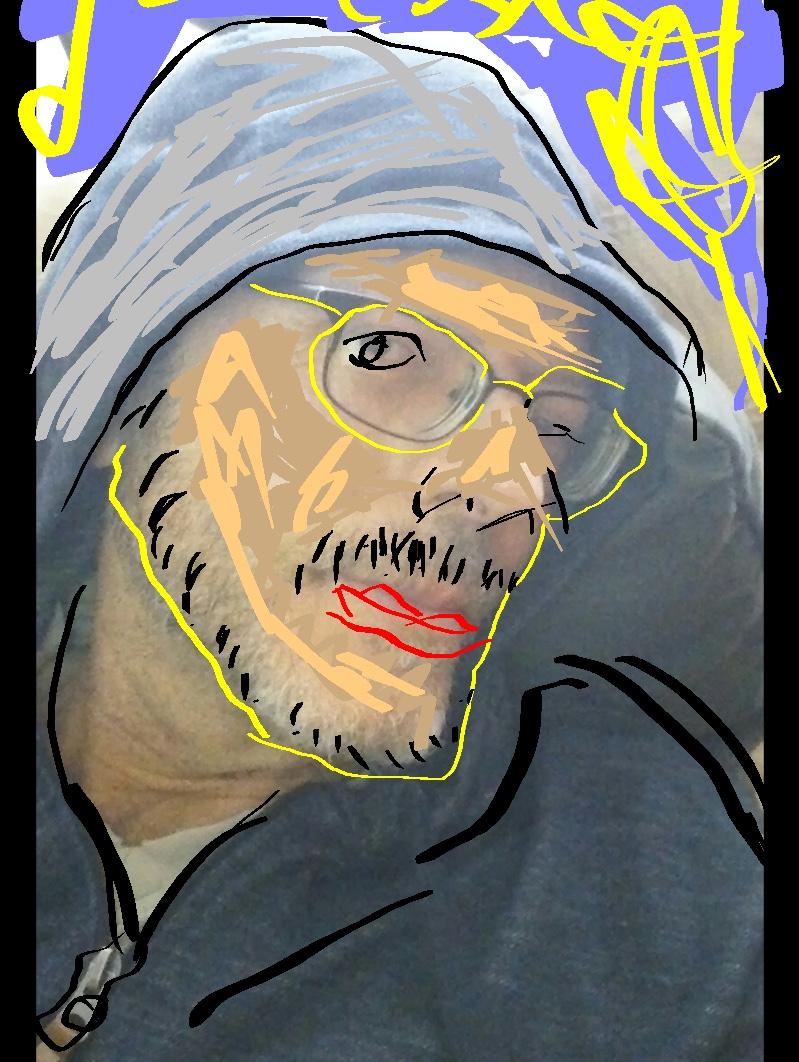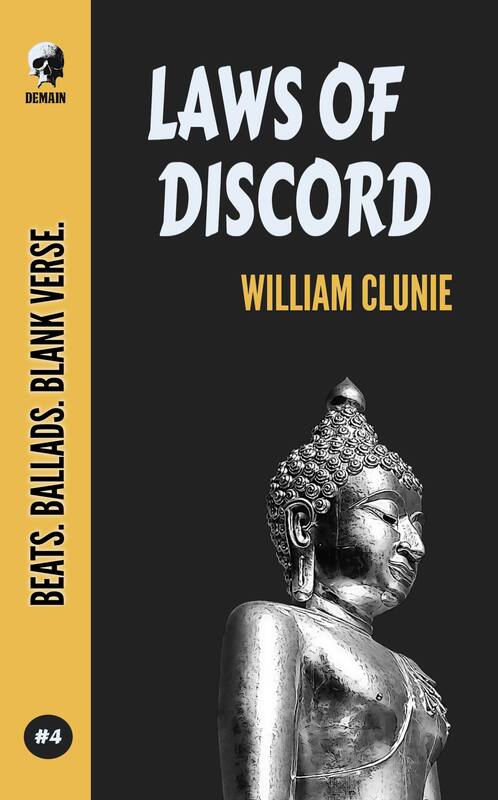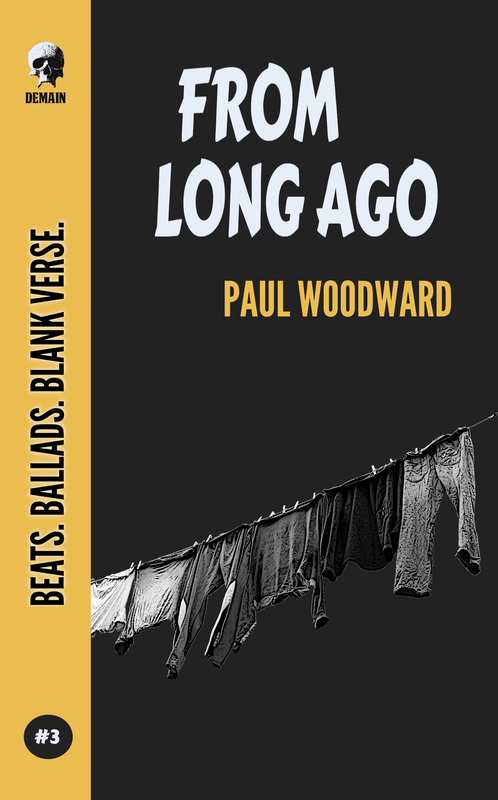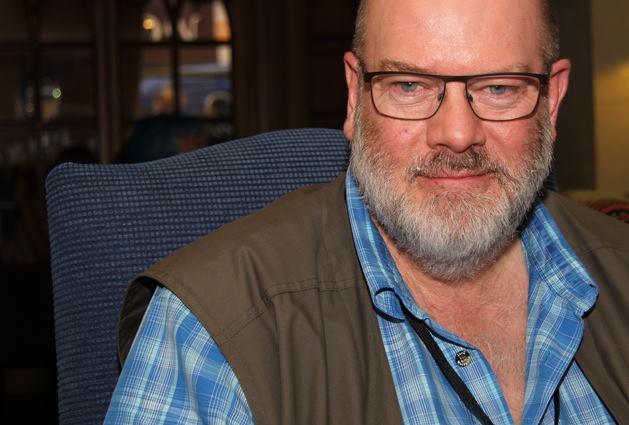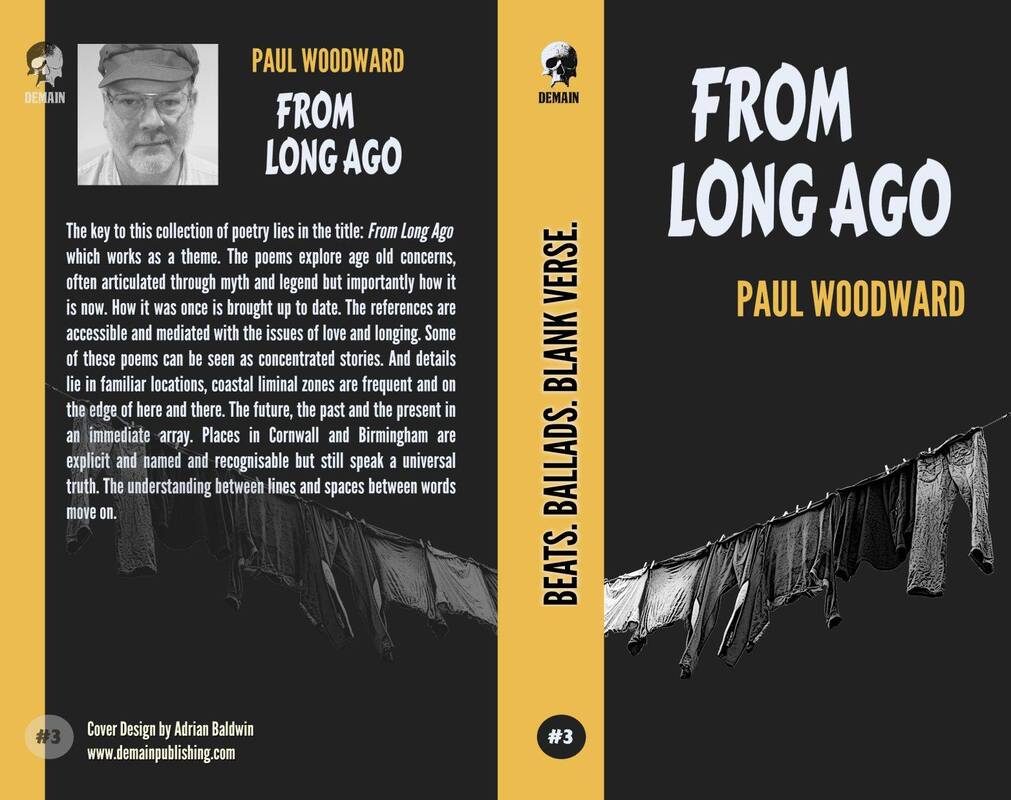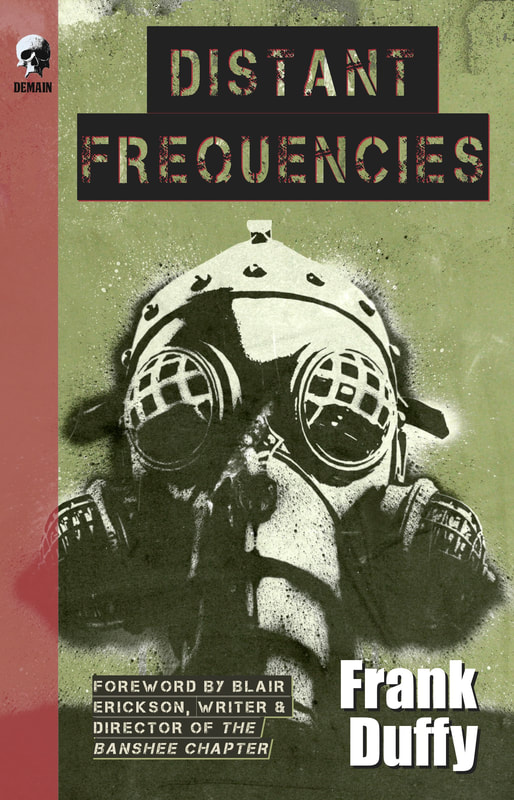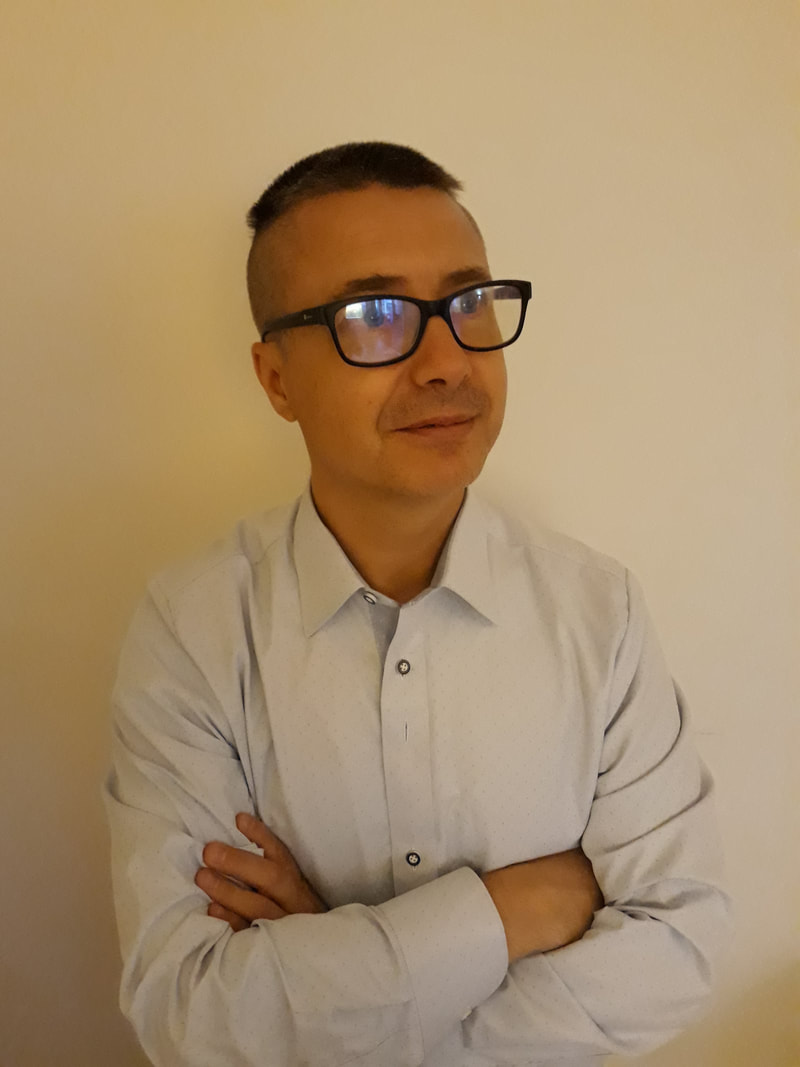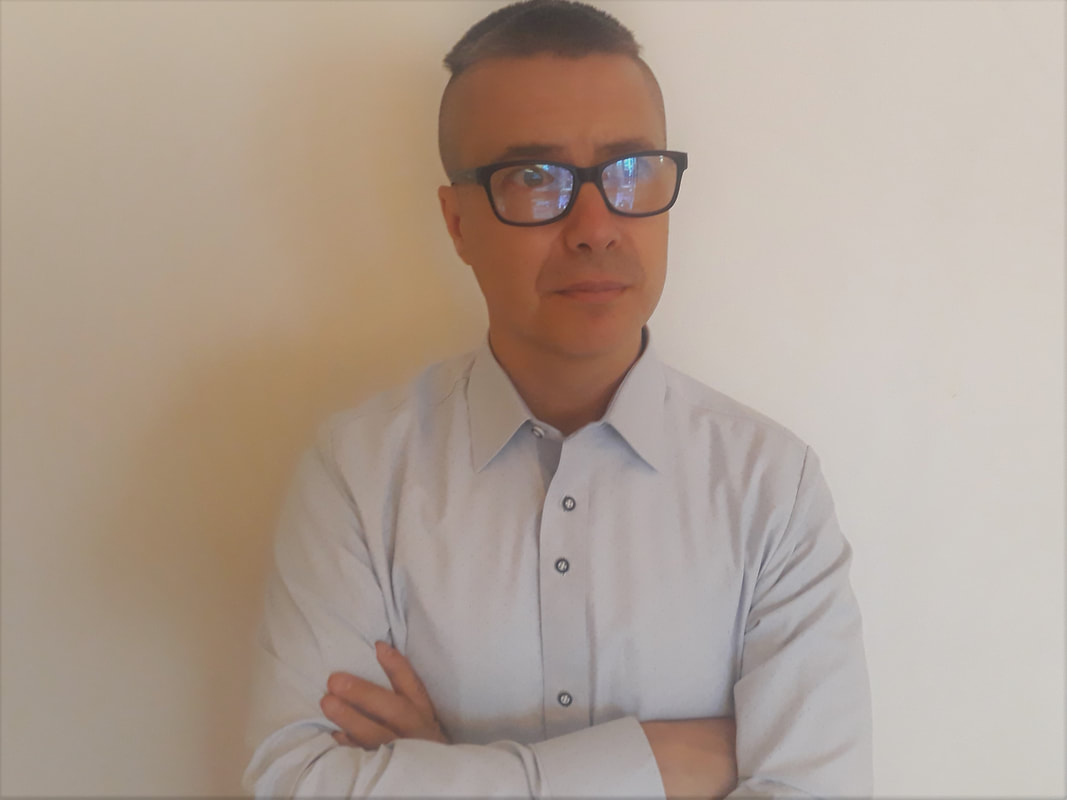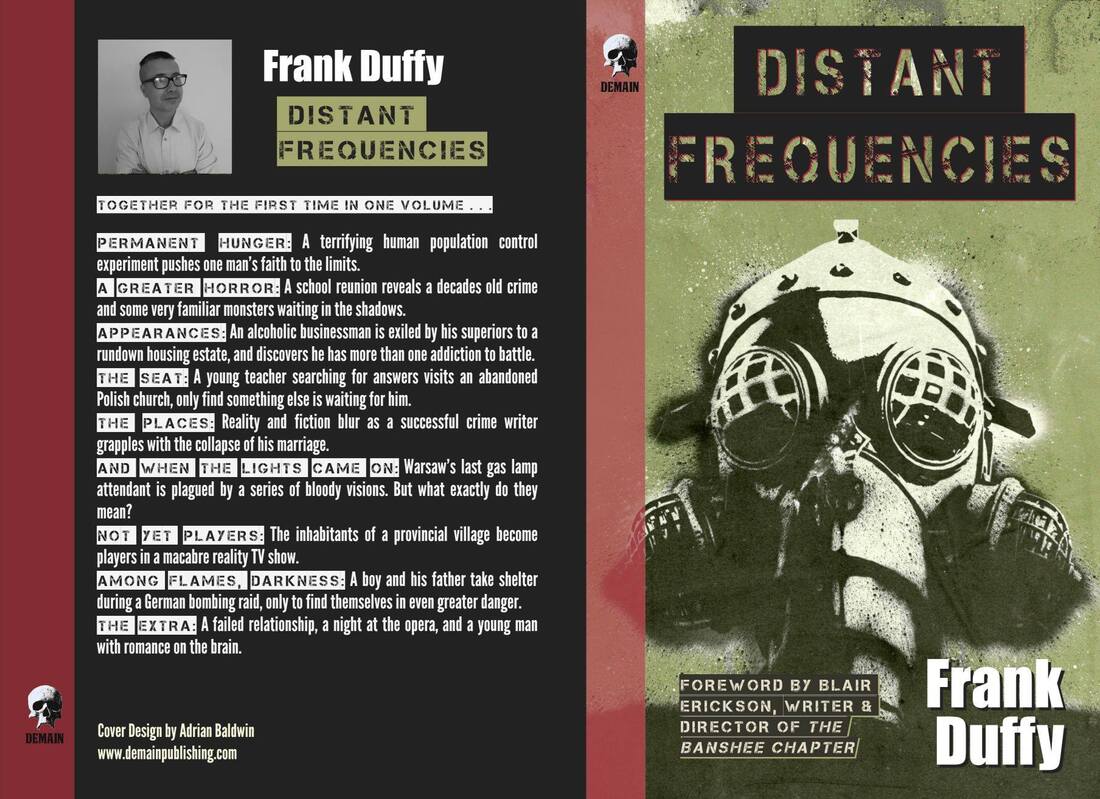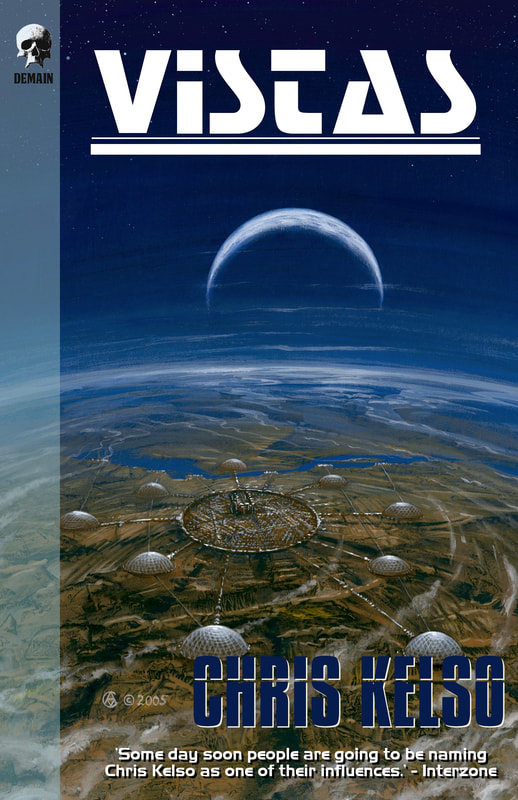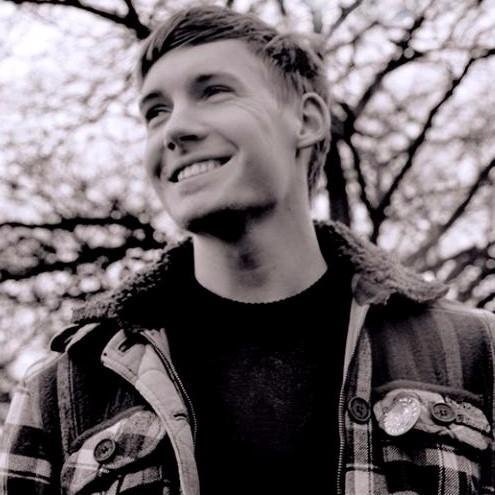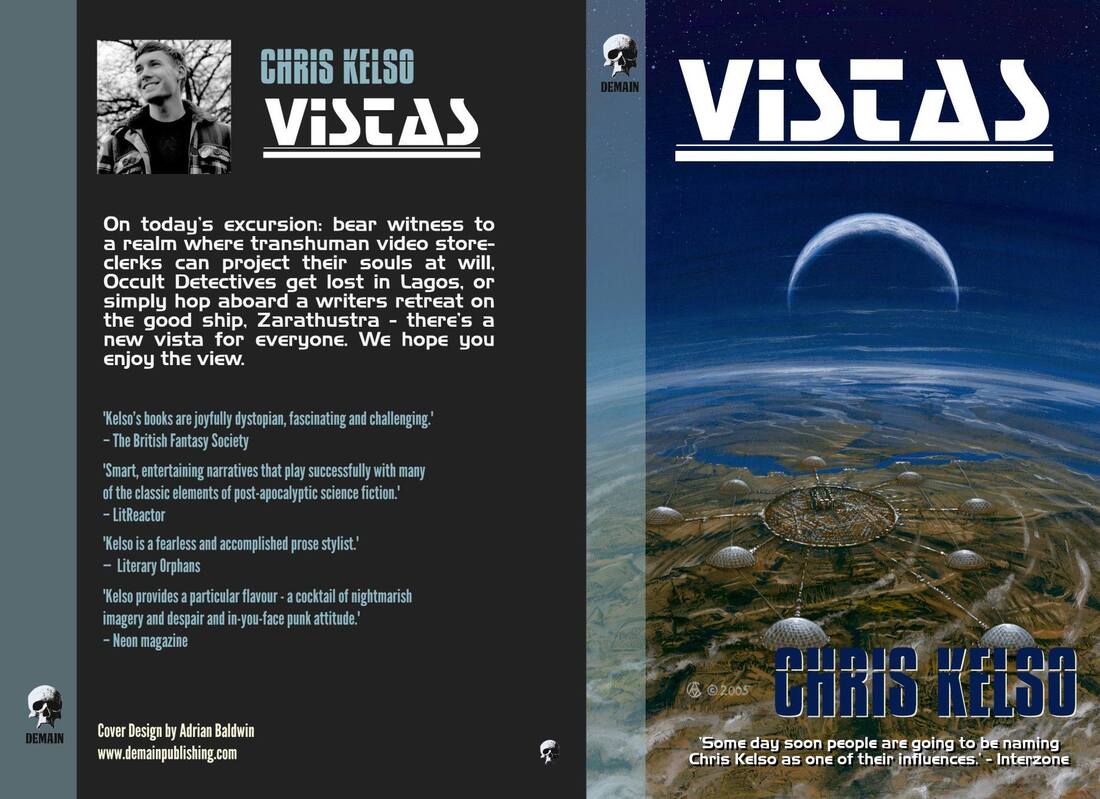|
|
|
Book four in the Beats! Ballads! Blank Verse! Series is William Clunie’s Laws Of Discord. The ebook is released on the 29th of May (though out now for pre-sales) – with a cover by Adrian Baldwin. With Bill based in Germany and Dean currently in the UK – their interview was conducted within social distancing rules.
DEMAIN PUBLISHING: Welcome William to DEMAIN, it’s a pleasure to have you on board. Can you tell us a little about yourself, do you come from a literary background at all? WILLIAM CLUNIE: Hi! And No. Not a textual background, anyway. The language was colourful in my family and the stories plentiful, but only as an oral tradition. Illiteracy was not uncommon in the older generations, but some of those plebs could tell a good story. Remembering the men-folk and their tales I think of the e.e. cummings lines “the boys i mean are not refined/they do whatever's in their pants/they speak whatever's on their minds/they shake the mountains when they dance.” I took to reading at an early age because of sickness, asthma and congenital disorders, and was always an outsider among those casual savages. DP: I’m not entirely au fait about cummings but read a couple of articles about him – very intriguing and I will read more, so thanks for that. As a child the what poets did you read… WC: I didn't come to poetry until I was seventeen when a friend gave me Allen Ginsberg. There was a poem about opposing armies putting down their weapons and “fucking rosily on the battlefield”. I was disgusted until I realized that to my mind having them slaughter each other would have been perfectly acceptable, mayhem, blood, and viscera just a yawn, but gods forbid they have sex. It made a 17-year-old think. DP: I bet it did. Did reading Ginsberg lead you into getting started as a poet and what attracted you to poetry in particular (rather than prose, as an example)? WC: I fell in love with the musicality of language through the Elizabethans and the Romantics, then appreciated the distillation of the world into imagery with the modernists, then tried to combine the traditions into Lofty Works, then decided that the pursuit of the intentionally lofty was a bit embarrassing. Then I wrote autobiographical 'drinking story' poems that were entertaining and forgettable , and now I just write a poem when a few lines won't let me go for whatever reason. DP: So you find writing poetry easy? WC: Yes because I only write it when I have no choice and it writes itself. Rewriting can be difficult, or rather sad. Throwing lines away that I loved at one time is more sad than difficult. DP: Right now I am writing a very specific short story (in terms of paragraph length and overall word count) so I know exactly what you mean about throwing lines away…it is very sad…how do your poems develop – would you say you have a specific writing method? Do you ever show unfinished work to friends / family… WC: I scribble lines down as they come to me, longhand, or stanzas, if more than one or two lines come, then type them all up in a Word file and sometimes return to them and add more, or combine them. Combining lines or images works because I'm usually ruminating on the same themes over the course of any given week or two so all, or many – or some at least – of the lines are connected either musically or thematically or both so pressing them into each other like working clay isn't as odd as it might seem. After they look something like a lyric I come back to the words later and see obvious new line breaks that have to be there or instances of necessary enjambment and I manipulate the technical aspects of the poem more than the content. At some point it's either a finished poem or something that doesn't work and has to be discarded or parted out into a few components to be used elsewhere. I don't show them to anybody as I work. I'm not always entirely comfortable showing them even after they're finished, to editors and publishers, say, or more accurately I'm not comfortable choosing the appropriate time to show them to editors and publishers. I wish they would stand and walk out the door when they're good and ready without even a backward glance, a bit rudely but entirely mature and on their own while I'm busy attending to the younger ones. DP: Ah, I love that image! Who are your favourite poets and who are you reading at the moment? WC: Favourites - Milton, e.e. cummings, Auden. Currently reading - John Clare, Eileen Myles, John Donne. DP: You read poetry regularly? WC: Yes, usually every day unless I'm so involved with a prose work that I can't put it down. DP: And finally William, do you think poetry can save / change the world? WC: It changed my world. It's changed the world of any number of people. Not sure it can change THE world, but poetry, along with all the arts, makes the world worth saving. DP: A great answer! Thanks William for your time – best of luck with Laws Of Discord If you would like to connect with William direct, please find him on Twitter at @billclunie
0 Comments
DEMAIN welcomes poet and author Paul Woodward with his Beats! Ballads! Blank Verse! Release From Long Ago. Paul’s collection is Book 3 in the series and is released on kindle on the 29th May (though it is currently available for pre-sales). The cover is once again by Adrian Baldwin. Dean and Paul recently virtually sat down and talked about it.
DEMAIN PUBLISHING: Hello Paul, let’s get straight down to it – what poets did you read as a child. PAUL WOODWARD: Hi. I’d like to say for me that poetry as a child was songs. Songs that were sung and recited. The Yellow Submarine by The Beatles I can particularly remember. Another one was If I Had a Hammer, although I can’t remember who that was by [probably Pete Seeger – he wrote the song anyway with Lee Hays] but it was very inspiring. And later as a teenager I loved Chaucer’s Prologue to the Canterbury Tales and would read it out loud. DP: Ah, we did the Prologue at school and it was very inspiring. I know there’s been a couple of attempts in the past but perhaps now is the right time for a film / film series based on the Canterbury Tales – we will have to give that more thought. In terms of writing poetry Paul, do you find it energises or exhausts you? PW: It definitely energises me. The sense of achievement when finishing a poem, a little final breath that it’s all over and complete. A lovely feeling. Although sometimes, if I’m honest, rehearsing for live performances can be exhausting, my throat can go dry and be afraid I might lose my voice. But fortunately that sort of thing doesn’t last very long. DP: Glad to hear it, do you have to do much research? PW: Not really. An idea starts with something I already know, and hopefully understand. I prefer not to structure ideas in poetry, but give structure to the lines and the cadence of the voice. As much as I am able of course. DP: I’m interested now in how your poems develop. Do you have a particular writing method? Do you show them to anyone as you draft? PW: My poems generally develop from the germ of an idea and maybe a single phrase which I repeat to myself until more words come. Occasionally I will write something down on a scrap of paper or increasingly these days a note to myself on a smartphone before then going to the computer to type. At that point the poem will write quite quickly, and then later edited and tweaked. I can only show a poem once it’s complete, or I think it’s complete. And then I have to read it out loud to myself. And ideally read it out loud to other people, and then I can test what works and what doesn’t. DP: A good method. You mentioned live performances earlier, do you enjoy promoting your poetry and getting out there and meeting your readers? PW: Yes. It’s lovely when people clap after I’ve read out loud. It feels like an achievement for want of a better way to describe. DP: What would you say is the best experience you’ve had through your poetry? PW: On a variety show once I had a 20 minute spot and I was the last one on before the headliners who were a musical act. When I finished and sat at the back behind the red velvet curtains the crowd shouted for more. It gave me butterflies in my stomach, or did my stomach lurch? A truly wonderful experience. DP: Sounds exhilarating. Would you say poetry can save the world? PW: No. Only people can. But poetry can provide some signposts along the way. DP: With regards to poetry as a form, would you say that the internet (and social media) is destroying it or helping it thrive? PW: I’m going to answer that with a stock phrase, which isn’t something I’ve thought of myself, but found: “They said if you give 24 monkeys a typewriter each they will eventually reproduce the complete works of Shakespeare.” Another bright spark replied, “With billions of people on Facebook that’s proved to be wrong.” DP: And finally Paul, should every poem mean something or can they just be enjoyed for their words or language? PW: I think definitely every poem should mean something and the words, the language, are the vehicle which carries the meaning. One of the French philosophers Saussure, I think, correct me if I’m wrong, argued that words and language were only symbols or signposts that point towards a shared understanding [that is more or less correct and many thanks for mentioning him!]. Thank you Paul for your time. Stay safe during the “lock down” and see you hopefully on the other side. Best of luck with your B!B!B! On 29th May 2020 we welcome Frank Duffy to DEMAIN with his collection of short stories, Distant Frequencies published in ebook (with a paperback version following in a couple of months) – a brilliant cover (as always!) by Adrian Baldwin. We’ve also been lucky in that American film writer, director and producer Blair Erickson (The Banshee Chapter et al) has written Frank a foreword. Just before the ‘lock down’ Frank (based in Poland) and Dean (currently in the UK) talked about the release and writing in general.
DEMAIN PUBLISHING: Hi Frank, let’s get straight down to it – can you tell us a little about yourself and why you became a writer. FRANK DUFFY: Hello! I was born in Liverpool in 1971, but grew up in Rainford, a typical provincial village on Merseyside. As far back as I can recall, the family home was always filled with books. My mum’s been a prodigious reader all of her life, and being from a working class family she knew it was important to encourage me to read as much as possible. I’m not saying growing up working class in the 1970s was a great hardship for me personally, it wasn’t as if I was being forced up chimneys and eating bowls of lard to pass the time before perishing of scurvy. But my mum was smart enough to support any interests I might have had knowing it might lead to better things for me generally. That’s not to say I was precociously aware of who I was at such an early age. I wasn’t wandering leafy bridle paths quoting Woolfe with typical teenage hand-wringing angst. I didn’t meditate away the emotional tumult simply by reading, but eventually the reading led to writing, and that in itself was a lifesaver. In the late 1970s, when I was about eight years old, a primary school teacher inadvertently kick started my obsession with writing. A tradition of hers was to read ghost stories to our class after Monday morning assembly, without a doubt the highlight of my week. On one particular morning she introduced us to the poem The Listeners by Walter De La Mare. I remember being struck by the extraordinary eeriness of what I was hearing, and though far from understanding any of it, on some basic level deep down, I must have been busy intuiting that there was something else at work. Afterwards, our teacher invited my class to write a story interpreting the meaning of the poem. Heady stuff for a class of eight year old kids way back in 1979! That Christmas my mum bought me a typewriter, upon request of course. It was perhaps a little bit odd for an eight year old boy to ask for a typewriter. By the time I reached secondary school, the typewriter had transformed into an electric typewriter, and shortly afterwards, I graduated to a word processor. At secondary school I would write page after page of short stories for English comprehension classes. Although this greatly annoyed the teacher, the rest of the class loved the idea of hearing them in their entirety. Compelled to read my stories aloud to what seemed an enraptured audience, the teacher failed to realise my classmates were far from fans of my writing, but enjoyed the fact my stories were so lengthy, they generally took up a good portion of the allotted forty-five minutes of lessons. Not that it ever stopped me. I wrote everywhere, even during maths and geology lessons, exacerbated by my complete lack of understanding for the majority of subjects. I joined writing classes at the local library in the nearby town. I wrote love letters for my friends to girls they fancied. I kept volumes of dream diaries believing they would come in handy for future stories. They never did. I wrote chapters of novels that never materialised beyond the first twenty pages. I wrote reviews for films. I wrote outlines for screenplays which never saw the light of day. I simply wrote and wrote and wrote. What made me become a writer? All of the above. DP: Thanks for that Frank. I’m definitely getting a fuller understanding of what makes you tick, particularly creatively – I did smile when you mentioned Wolfe etc. At my school you did get the odd one or two ‘precocious’ (or perhaps pretentious would be a better word) boys who’d walk around with obscure ‘classics’ in their blazer pockets that they’d whip out every now and again to impress a passing master…still makes me laugh to this day, one in particular, Michael Cou…no, better not say anymore – I might write about him one day. Anyway, tell us about Distant Frequencies please. FD: Distant Frequencies is a selection of reprints taken from my first three collections. Most of the stories were written over a six year period in Poland. I wanted to put these stories together in one collection since I felt they had something in common. Partly they share a similarly emotional resonance despite their wildly different narratives. DP: And did you have to do much research when writing the individual stories? FD: Not much at all. Generally speaking, I only do research when absolutely necessary. Although that doesn’t mean I haven’t done so in the past. For example, I once conducted a huge amount of research for a novel called Immersion. Amongst other things, the story centred on artificial intelligence, dating sites, and the evolution of sexual language amongst men and women. The research involved interviews, speaking to sociology faculties monitoring social behaviour in adult males engaged in online dating which meant sifting through literally thousands of pages of academic reports. I found the research fascinating, but at one point I was ready to give up on the novel because I was trying to cram too much of it into the story. Equally as important was that fact that writing about AI brought with its own problems. I’m not a science fiction writer, and writing about such a complex subject requires great technical skill. I can’t pretend I’m that sort of a writer. Therefore, research is often something I have to be fully conversant with, or at least able to write about without sounding like a phoney. I’ll leave the science fiction to the writers in that genre. So, as I said, I tend to research only when absolutely necessary. It saves face. DP: Ah, some good points made. I’m personally writing a very specific historical / period drama script right now and it’s not always deciding what should stay in / what should be taken out of the story – though it’s only a couple of years I’m looking at it’s very easy to drown in the research…did you find any of the stories particularly difficult to write? FD: I don’t think so. Not technically at least. Nor emotionally. I suppose wanting to add some degree of authenticity is the biggest challenge. I like to create stories which usually have a background in reality, no matter where they eventually end up. But at the same time, I don’t want to bleed out any of the mystery. And that’s always a danger when trying to write a genre story, attempting to get the balance just right. I want to be truthful in terms of how the characters and story develops, but I don’t want to bore the reader by being overzealous in my adherence to details which most people probably won’t even notice. DP: What books (or authors) would you say have influenced you? FD: I tend to read a lot of non-fiction these days. It can be anything from biographies, history, politics and travel - and those books connected with the effect of technology on modern society. Sort of the Black Mirror domain of storytelling. I’m a real sucker for music biographies, especially about the punk and post-punk revival scene. As for genre books, nowadays I read a lot more crime than horror fiction. There’s no reason for that, it’s not a conscious choice, although I’m sure it’s connected to my own writing moving into other genres. I read writers from every genre imaginable, and some of those I read more regularly than others. I wouldn’t say any of them influence me directly, not now. But when I first started writing I was heavily influenced by Ramsey Campbell. Soon I’m going to start a novel based around the UK rave culture scene of the early 90s. This came about because of the music books I was reading over the last two years, but also because of a conversation I had with my friend Kate Hoare, who was very much part of that movement. That’s probably for me my biggest source of influence these days, firsthand accounts from people who were there. DP: And is there a particular genre book (or film) that you’re particularly looking forward to? FD: Most definitely Ramsey’s Campbell’s The Wise Friend and Laird Barron’s Worse Angels. Christopher Nolan’s Tenet is top of my films to watch, as is anything he turns his hand to. As for TV, I’ve got high expectations for a six part HBO limited series called The Third Day, starring Jude Law in what seems to have Wicker Man overtones. DP: Oh really, haven’t heard of The Third Day will definitely have to check that out. So creatively is there anything you’d like to do which you haven’t yet? FD: Not so much a case of not having done, more a case of seeing it come to fruition. Three years ago I started working for feature film director Blair Erickson (The Banshee Chapter) on an eight part TV series screenplay. As well as working with Blair, I worked alongside another writer, the brilliant Pamila Payne. I won’t go into specifics as it would take forever and a day, but we got as far as a sit-down meeting with Shudder. For now, the project is on hold, but I’d dearly love to see it get into production. It’s a great story. DP: Best of luck with that and hopefully, as you say, it does see the light of day sometime very soon after the ‘lock down’ – how are you handling that by the way? Has it affected you much? FD: I love the outdoors, and I make the most of the fact I live ten minutes from a forest. I’m really into long distance walking and cycling, so not being able to do these until the Polish government recently lifted restrictions was obviously one of the disappointments that comes with having a lock down. But it’s nothing to complain about. People are going through hell out there. Mentally, I feel good. My wife Angelika is partially responsible for that as she’s so easy to live with. The only thing I’m doing different apart from following the restrictions rules, is working from home all the time. But in the great scheme of things. It’s no biggie. I guess you could say I’m getting on with it. DP: Good for you. Finally then Frank, can you tell us something your readers might be surprised to find out about you? FD: For the last twenty-five years I’ve been a vocalist and lyricist for an assortment of alternative experimental rock bands. The last band, 100 Ass Cactus, were the craziest bunch of disparate characters you can imagine. We made Spinal Tap look serious by comparison. During my time with 100 we climbed a mountain during a snowstorm to reach a gig that never happened, played a private gig for a famous Polish band that went horribly wrong, and headlined a local cub concert armed with only four songs. Well, on that note, thank you very much Frank and all the best for Distant Frequencies. Friday 29th May 2020 sees the ebook publication of Chris Kelso’s Science Fiction collection, Vistas. This is a real coup for DEMAIN. During the pandemic (and keeping to social distancing rules!) Dean and Chris sat down and talked about it.
DEMAIN PUBLISHING: Welcome Chris, this is an honour…can you tell us a little about yourself and how you became a writer. CHRIS KELSO: Many thanks! I’m a 32-year-old writer and editor from Scotland, but I also teach secondary English. I became a writer, or started writing at least, after I read Lanark by Alasdair Gray. Lanark blends surrealism and realism, art, and literature, in a way I’d never seen before - and it really opened my eyes to the multimedia experience of the novel. At 23 I had my first short story published in the Evergreen Review (a derivative little pastiche of Burroughs in Hell) and that sort of gave me the confidence to try to sell longer work. I suppose I became a writer to prove something to myself. That I could contribute something. DP: I love Lanark. I will admit it took me a little while to get into it but I persevered and yeah, I really love it. We both have a fondness for Burroughs too...can you tell us about Vistas? CK: It’s a science fiction collection. I took my main inspiration from writers like Harlan Ellison, Philip Jose Framer, and Joanna Russ. I consider myself a genre writer, and at times I like to blend tropes and conventions, but this is a real SF book. Most stories are set in space or some fantastic land, and incorporate some sort of techno-babble, allusion to time travel, or the babysitting of bad machines. I consider this to be my last short story collection (for a long time at least) so it’s nice to leave a farewell love letter to a genre I love. DP: And that’s another reason why we’re honoured here at DEMAIN – thank you for allowing us to publish your ‘final’ collection. Did you have to do much research when writing the stories? CK: [In general terms I do] research, usually technical detail – the mechanics of an object, the practical terms for this and that. For example, when I was writing The DREGS Trilogy [Black Shuck Books] I did a lot of research into the Dark Web and serial killer profiles. I recently finished my first non-fiction book, Burroughs and Scotland so there was a lot of digging involved trying to unearth information on a largely forgotten/unexplored period of WSB’s life. DP: I’ve seen that DREGS is already picking up some great notices – well done and definitely can’t wait to read Burroughs and Scotland! Did you find any of the stories in Vistas particularly difficult to write? CK: I found the story T/ROLL a challenge because it was written in a reddit forum-style. It was more fiddly than difficult, but putting in a lot of attention to the characters’ reddit profiles meant I was more engaged with the piece as a whole. DP: What would you say is your biggest success creatively so far? CK: I’d say The DREGS Trilogy is my most immersive and successful book – in terms of what I was trying to achieve. Whether it becomes a financial or critical success remains to be seen (although Jim McLeod at Ginger Nuts of Horror has done a lot to promote the book). It seems to be reaching the right audience and hitting the mark so far, but these things can fall apart so quickly, especially with a work as confrontational as DREGS. I wrote a story with Carole Johnstone for Black Static magazine that was nominated for a British Fantasy Award, so I suppose, when it comes to community acknowledgement, this has been the biggest success. It really depends on your definition. DP: Indeed it does. Jim’s a good guy and when he gets behind you he really does so again, well done. What books (or authors) do you read and would you say they have had an influence on you as a writer? CK: I read so much. Alasdair Gray might be my most important writer. I have my roots in the Beats (Burroughs in particular), but I love Ellison, Bukowski, Butler, Selby Jr. Bret Easton Ellis, Iain Sinclair, J.M.Coetzee, Philip K. Dick, Patricia Highsmith, Kathy Acker, Sam Delany, Dennis Cooper, the list is endless. I’d say they all influence me, more in terms of style than concept. A lot of writers I know have influenced me, people like Graham Rae, John Langan and Seb Doubinsky, Dave Jeffrey, Laura Mauro, Steve Finbow or Hal Duncan. I’m reading a great book called My Shadow Book by Jonathan Rothacker that’s as good as anything I’ve ever read. Mauro’s Naming the Bones is incredible, as is Graham Rae’s Soundproof Future Scotland. All these people are in my immediate community and they all keep you on your toes. Remind you to keep pushing yourself. DP: That’s sound advice. I would say that a lot of your work (which I’ve read anyway) is quite ‘weird’ – what is ‘weird’ to you? CK: I suppose the writers who inhabit a number of categories are of particular interest. Writers like Dennis Cooper or Poppy Z. Brite are writers who can write in the guise of literary fiction but imbue their work with horrific and weird moments – Carole Johnston does this well in her short fiction. The cumulative effect is of an uncanny, almost cosmic existential dread. I think about House of Leaves by Mark Z. Danielewski or VanderMeer’s, Annihilation as strong examples of truly weird fiction. DP: I’m definitely a fan of House Of Leaves and have recently read a couple of Cooper’s novels – very intriguing. In terms of upcoming (whenever that may be right now) books or movies – is there anything that piques your interest? CK: Sure, I mentioned My Shadow Book already, but it’s really absorbing. Seb Doubinsky’s The Invisible is calling out to me. I have Priya Sharma’s, All the Fabulous Beasts to read next and can’t wait. I also have Alan M. Clark’s Jack the Ripper Victim series to get through, as well as Dave Jeffrey’s A Quiet Apocalypse – and am equally excited! DP: From a DEMAIN point of view thanks for mentioning Dave’s A Quiet Apocalypse! What is Chris Kelso afraid of? CK: Spiders! I’m afraid of spiders. Spiders were a prominent feature in my work until recently. In the Slave State, there was a quarter in the 4th dimension with huge man-sized arachnids waiting, who spun webs across bridges and skyscrapers and ate people. That’s literally a recurring nightmare of mine. DP: Me too! Creatively is anything you haven’t yet done? CK: I’d like to write more non-fiction and screenplays - and maybe try writing another comic book. It would be amazing to write a 2000AD strip one time. I’ve been so immersed in that world over the course of my young life, I know I could do it justice. DP: That’s brilliant – looking forward to seeing that. So, the elephant in the room: how are you handling the current lockdown, what’s your routine, is there anything different you are doing that you wouldn’t usually? CK: I’m teaching my classes remotely, so engaging with students is my primary focus. I’ve been making resources and enhancing my CPD (Continual Personal Development) profile. I find the odd moment to add footnotes and references to my Burroughs book as well, which has been strangely relaxing. Aside form that I’ve been reading like a maniac, watching Netflix, doing mini-workouts, and spending time with my fiancé. I think you need to make time for things you enjoy during lockdown, but also to push yourself. DP: Yeah, it’s not an easy time is it…finally then Chris, can you tell your readers something surprising about you? CK: Probably that I’m a soft-hearted vegan. Thank you so much for your time and the best of luck with Vistas. If you would like to connect with Chris direct: Website: http://www.chris-kelso.com/ Twitter: @ChrisKelso5 |
CategoriesArchives
July 2024
AuthorDean M. Drinkel |
